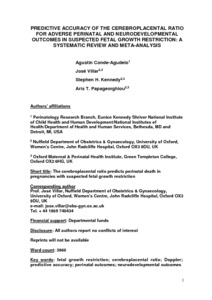Conde-Agudelo, A; Villar, J; Kennedy, SH; Papageorghiou, AT
(2018)
Predictive accuracy of cerebroplacental ratio for adverse perinatal and neurodevelopmental outcomes in suspected fetal growth restriction: systematic review and meta-analysis.
Ultrasound Obstet Gynecol, 52 (4).
pp. 430-441.
ISSN 1469-0705
https://doi.org/10.1002/uog.19117
SGUL Authors: Papageorghiou, Aris
![[img]](https://openaccess.sgul.ac.uk/111366/1.hassmallThumbnailVersion/Conde_agudelo_2018_predictive_accuray_of.pdf)  Preview |
|
PDF
Accepted Version
Available under License ["licenses_description_publisher" not defined].
Download (144kB)
| Preview
|
Abstract
OBJECTIVE: The cerebroplacental ratio (CPR) has been proposed for the routine surveillance of pregnancies with suspected fetal growth restriction (FGR), but the predictive performance of this test is unclear. The aim of this study was to determine the accuracy of CPR for predicting adverse perinatal and neurodevelopmental outcomes in suspected FGR. METHODS: PubMed, EMBASE, CINAHL and Lilacs were searched from inception to 31 July 2017 for cohort or cross-sectional studies reporting on the accuracy of CPR for predicting adverse perinatal and/or neurodevelopmental outcomes in singleton pregnancies with FGR suspected antenatally based on sonographic parameters. Summary receiver-operating characteristics (ROC) curves, pooled sensitivities and specificities, and summary likelihood ratios (LRs) were generated. RESULTS: Twenty-two studies (including 4301 women) met the inclusion criteria. Summary ROC curves showed that the best predictive accuracy of CPR was for perinatal death and the worst was for neonatal acidosis, with areas under the summary ROC curves of 0.83 and 0.57, respectively. The predictive accuracy of CPR was moderate to high for perinatal death (pooled sensitivity and specificity of 93% and 76%, respectively, and summary positive and negative LRs of 3.9 and 0.09, respectively) and low for composite of adverse perinatal outcomes, Cesarean section for non-reassuring fetal status, 5-min Apgar score < 7, admission to the neonatal intensive care unit, neonatal acidosis and neonatal morbidity, with summary positive and negative LRs ranging from 1.1 to 2.5 and 0.3 to 0.9, respectively. An abnormal CPR result had moderate accuracy for predicting small-for-gestational age at birth (summary positive LR of 7.4). CPR had a higher predictive accuracy in pregnancies with suspected early-onset FGR. No study provided data for assessing the predictive accuracy of CPR for adverse neurodevelopmental outcome. CONCLUSION: CPR appears to be useful in predicting perinatal death in pregnancies with suspected FGR. Nevertheless, before incorporating CPR into the routine clinical management of suspected FGR, randomized controlled trials should assess whether the use of CPR reduces perinatal death or other adverse perinatal outcomes. Copyright © 2018 ISUOG. Published by John Wiley & Sons Ltd.
| Item Type: |
Article
|
| Additional Information: |
This is the peer reviewed version of the following article: Conde‐Agudelo, A. , Villar, J. , Kennedy, S. H. and Papageorghiou, A. T. (2018), Predictive accuracy of cerebroplacental ratio for adverse perinatal and neurodevelopmental outcomes in suspected fetal growth restriction: systematic review and meta‐analysis. Ultrasound Obstet Gynecol, 52: 430-441, which has been published in final form at https://doi.org/10.1002/uog.19117. This article may be used for non-commercial purposes in accordance with Wiley Terms and Conditions for Use of Self-Archived Versions. |
| Keywords: |
Doppler, cerebroplacental ratio, fetal growth restriction, neurodevelopmental outcomes, perinatal outcome, predictive accuracy, Child Development, Developmental Disabilities, Female, Fetal Growth Retardation, Humans, Infant, Newborn, Middle Cerebral Artery, Placenta, Predictive Value of Tests, Pregnancy, Pulsatile Flow, Reference Standards, Ultrasonography, Prenatal, Umbilical Arteries, Middle Cerebral Artery, Umbilical Arteries, Placenta, Humans, Fetal Growth Retardation, Ultrasonography, Prenatal, Predictive Value of Tests, Child Development, Developmental Disabilities, Pregnancy, Pulsatile Flow, Reference Standards, Infant, Newborn, Female, cerebroplacental ratio, Doppler, fetal growth restriction, neurodevelopmental outcomes, perinatal outcome, predictive accuracy, 1114 Paediatrics And Reproductive Medicine, Obstetrics & Reproductive Medicine |
| SGUL Research Institute / Research Centre: |
Academic Structure > Institute of Medical, Biomedical and Allied Health Education (IMBE)
Academic Structure > Institute of Medical, Biomedical and Allied Health Education (IMBE) > Centre for Clinical Education (INMECE ) |
| Journal or Publication Title: |
Ultrasound Obstet Gynecol |
| ISSN: |
1469-0705 |
| Language: |
eng |
| Publisher License: |
Publisher's own licence |
| Projects: |
|
| PubMed ID: |
29920817 |
| Web of Science ID: |
WOS:000446332600004 |
| Dates: |
| Date |
Event |
| 2018-10-04 |
Published |
| 2018-09-05 |
Published Online |
| 2018-05-23 |
Accepted |
|
 |
Go to PubMed abstract |
| URI: |
https://openaccess.sgul.ac.uk/id/eprint/111366 |
| Publisher's version: |
https://doi.org/10.1002/uog.19117 |
Statistics
Item downloaded times since 07 Nov 2019.
Actions (login required)
 |
Edit Item |



